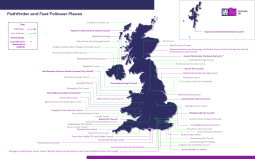Climate change blog - financing local net zero projects
Hannah Bartram, ADEPT CEO, reports on an important presentation to the Climate Change Board from UKRI/Innovate UK.
Our guest speaker at the ADEPT Climate Change Board meeting on 23 January was Sophie Kempthorne, Innovation Lead – Place-based Finance for Net Zero at UKRI/Innovate UK. UK Research and Innovation (UKRI) is a non-departmental public body that directs government funding for research and innovation. Innovate UK is the national innovation agency that supports business-led innovation in all sectors, technologies and regions. Innovate UK has nine Catapults including the Energy Systems Catapult that has recently presented its work on Local Area Energy Plans at various ADEPT forums.
In December, Innovate UK and PwC published a new Financing Local Net Zero Projects guide for local authorities, looking at the private capital required for local net zero projects and how to unlock and accelerate it. Sophie presented the report’s key findings and talked about Innovate UK’s Net Zero Living programme and the £35 million investment announced in December to help local authorities across the UK tackle the barriers to climate action projects, speed up their progress to net zero, share expertise, and unlock investment opportunities.
Their starting point is that local net zero could open up a £500bn investment opportunity. £20 billion a year is needed for local investments, predominantly in buildings and transport as well as local energy assets involved in both supply and demand management. Innovate UK’s research shows that almost half of this will need to be provided by the private sector, which opens up exciting local investment opportunities.
To meet the UK’s 2050 climate targets while creating healthier, more prosperous places we need to mobilise this private sector green investment. Like many other organisations, Innovate UK understand the importance of local places in delivering net zero: PwC/UKRI research Accelerating net zero delivery (2022) found that delivery tailored to local places could generate four times greater value than a national, one-size-fits-all approach. Various government initiatives are now working to empower local authorities to play a leading role in this transition. Examples include the Trailblazer devolution deals for combined authorities in Greater Manchester and the West Midlands, £19million funding for the DESNZ Local Net Zero Accelerator pilots, and new clarity around the role of local energy planners led by Ofgem.
But local authorities need more capacity to mobilise green investment in their towns and cities.
The new guidance reaffirms that the future of energy is local. Many of the critical actions we need to deliver net zero in buildings and transport can only be delivered locally. It is increasingly recognised that local authorities will play a key role in delivering the UK Net Zero Strategy, and Chris Skidmore’s Mission Zero review underscored this. But local authorities need more capacity to mobilise green investment in their places. With this in mind, UKRI commissioned PwC to answer the following questions:
- How much of the UK’s total net zero investment must be spent in local places?
- How much of this will need to come from private sources?
- How aware are investors about these investment opportunities?
- What support do local authorities and innovators need to access the private capital required?
Electrifying our towns and cities will increase demand on the grid. And to transition to renewable energy, we’ll need to generate power at all scales across a decentralised energy system. Balancing supply and demand within this new energy system will call for storage solutions and smart technologies at the local level to manage fluctuations and enable greater resilience. Reducing energy demand by improving energy efficiency and retrofitting will also be necessary.
A local approach generates higher benefits for lower costs. Harnessing local knowledge, engaging with communities, and tailoring actions to specific places can also lead to significant cost savings. The UKRI/PwC analysis showed that a place-based approach to net zero could save £137 billion in investment to cities while generating an additional £431 billion in energy savings and wider social co-benefits. For example, by engagement and building local consent for change, identifying financial opportunities for investors, building resilience to extreme weather events and reducing the risk of future price changes, enabling local growth in jobs and skills, and improving health and wellbeing from cleaner air and better living conditions.
Local Net Zero projects will drive the transition, targeting emission reductions across sectors within a local economy, but predominantly in buildings, energy and transport. They can combine parts of the local energy system in a more cost-effective way; for example, by matching excess supply of heat or energy with where it is in demand locally. Local authorities and innovators can design their projects with a local lens at the start – for example, a waste heat plant and solar farm powering a new build development. Or they can link supply and demand retrospectively or incrementally – such as recovering heat from waste plants, transport operations, or even old mines.
Innovate UK asked investors what their perceptions of the challenges were and what action is needed to unlock local net zero investment. Despite pockets of success, most local authorities across the UK still lack the capacity and capital needed to scale up their projects to deliver their net zero ambitions, and most investors are currently unaware of this significant market opportunity. Why?
The results of this engagement with investors show that the challenge is no longer technical. In their responses, investors described various financial, structural and regulatory barriers that are currently blocking significant levels of investment. These include a lack of capacity for developing and commercialising projects, limited investor engagement with the sector, and an uncertain policy and funding environment. The new guidance:
- sets out local authorities’ powers,
- describes the steps from a net zero pathway plan to an investible portfolio by building the business model for individual projects,
- provides an overview of the typical options a Local Authority has in determining the right commercial structure, and
- outlines implications of the commercial structure from an accountancy, tax and legal perspective.
More broadly, Innovate UK’s Net Zero Living programme is a £60 million, three-year programme that aims to help places and businesses across the UK to accelerate the delivery of the transition to net zero. The programme aims to help places to open markets by removing the non-technical barriers to the adoption of net zero solutions, driving widespread business growth and innovation across the economy, and unlocking significant additional private investment to enable true levelling-up both between and within places.
The programme will provide £45 million of support to help tackle the barriers to climate action projects, speed up their progress to net zero, share expertise and unlock investment opportunities. This includes direct grant funding, capability building support and a fully funded technical assistance facility. It will support a cohort of around 50 local authorities that have received funding for projects under its Net Zero Living programme. Among these are seven demonstrators (local authorities amongst the furthest ahead in their net zero journeys) and 21 fast followers (local authorities at an earlier stage of their net zero journey). The seven demonstrators have been funded by the Innovate UK net zero pathfinder phase two competition for 21 months, to run multi-million-pound practical projects on implementing net zero projects and unlocking barriers to delivery. In addition, a further 14 local authorities have been awarded up to £150,000 each to continue with their plans to tackle the barriers to decarbonisation.
Twenty-one fast followers were funded for 24 months under the Innovate UK fast follower competition, to recruit a net zero innovation officer. This resource is designed to help the authority to deliver net zero pilot projects, participate fully in the Innovate UK programme, and then take the learning and insights back into their organisations. (A map of these can be accessed in the image below).
While each place has received grant funding for its own net zero work, Future Ready brings them together to:
- create mutual opportunities for knowledge exchange, upskilling and collaboration
- explore innovative and creative approaches to delivering net zero projects
- provide a community of practice to share learning and a Future Ready Academy to build skills and capacity.
Partners in the learning network and community of practice include Urban Foresight, Liminal, and Forum for the Future. Innovate UK is in the latter stages of procuring a pool of technical assistance experts who will deliver tailored support to the cohorts across key barrier areas such as citizen engagement, decarbonisation pathway planning, finance and policy and regulation. The programme and all of its partners have committed to ensuring it creates opportunities for widespread knowledge exchange with those outside of the funded programme so no place is left behind. Watch out for programme announcements and news here.
Author
Hannah Bartram, ADEPT's Chief Executive Officer
Further information
Financing Local Net Zero Projects - A Guide for Local Authorities from UKRI/Innovate UK


